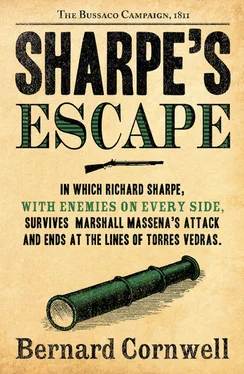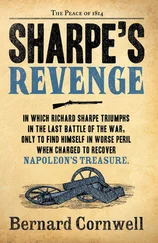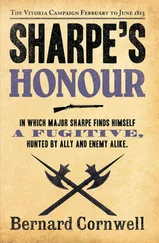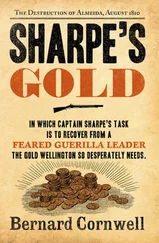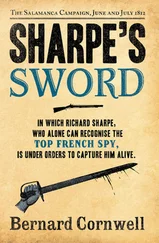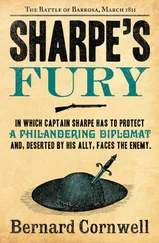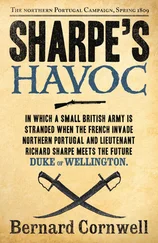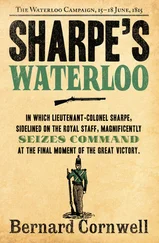1 ...7 8 9 11 12 13 ...23 Except some were already climbing. A score of mounted officers, wanting a closer view of the British and Portuguese position, had ridden their horses along the summit of the spur which jutted out from the long ridge. The spur was less than half the height of the ridge, but it provided a platform on which troops could gather for an assault and the British and Portuguese gunners had plainly marked it as a target for, as the French horsemen neared the place where the spur joined the ridge, a cannon fired. The sound was flat and hard, startling a thousand birds up from the trees which grew thick on the ridge’s reverse slope. The gun’s smoke roiled in a grey-white cloud that was carried east on the small wind. The shell left a trace of powder smoke from its burning fuse as it arced down to explode a few paces beyond the French horsemen. One of the horses panicked and bolted back the way it had come, but the others seemed unworried as their riders took out telescopes and stared at the enemy above them.
Then two more guns fired, their sound echoing back from the eastern hills. One was evidently a howitzer for the smoke of its burning fuse went high in the sky before dropping towards the French. This time a horse was flung sideways to leave a smear of blood on the dry, pale heather. Sharpe was watching through his telescope and saw the unsaddled and evidently unwounded Frenchman get to his feet. He brushed himself down, drew a pistol and put his twitching horse out of its misery, then struggled to release the precious saddle. He trudged back eastwards, carrying saddle, saddle cloth and bridle.
More French, some mounted and some on foot, were coming to the spur. It seemed a madness to go where the guns were aiming, but dozens of French were wading through the stream and then climbing the low hill to stare up at the British and Portuguese. The gunfire continued. It was not the staccato fire of battle, but desultory shots as the gunners experimented with powder loads and fuse lengths. Too much powder and a shot would scream over the spur to explode somewhere above the stream, while if the fuse was cut too long the shell would land, bounce and come to rest with the fuse still smoking, giving the French time to skip out of the way before the shell exploded. Each detonation was a puff of dirty smoke, surprisingly small, but Sharpe could not see the deadly scraps of broken shell casing hiss away from each blast.
No more French horses or men were struck. They were well spread out and the shells obstinately fell in the gaps between the small groups of men who looked as carefree as folk out for a walk in a park. They stared up at the ridge, trying to determine where the defences lay thickest, though it was surely obvious that the places where the two roads reached the summit would be the places to defend. Another score of cavalrymen, some in green coats and some in sky blue, splashed through the stream and spurred up the lower hill. The sun glinted on brass helmets, polished scabbards, stirrups and curb chains. It was, Sharpe thought, as though the French were playing cat and mouse with the sporadic shell fire. He saw a shell burst close by a group of infantrymen, but when the smoke cleared they were all standing and it seemed to him, though they were very far away, that they were laughing. They were confident, he thought, sure they were the best troops in the world, and their survival of the gunfire was a taunt to the defenders on the ridge’s top.
The taunting was evidently too much, for a battalion of brown-jacketed Portuguese light troops appeared on the crest and, scattered in a double skirmish chain, advanced down the ridge’s slope towards the spur. They went steadily downhill in two loose lines, one fifty paces behind the other, both spread out, giving a demonstration of how skirmishers went to war. Most troops fought shoulder to shoulder, but skirmishers like Sharpe went ahead of the line and, in the killing ground between the armies, tried to pick off the enemy skirmishers and then kill the officers behind so that when the two armies clashed, dense line against massive column, the enemy was already leaderless. Skirmishers rarely closed ranks. They fought close to the enemy where a bunch of men would make an easy target for enemy gunners, and so the light troops fought in loose formation, in pairs, one man shooting and then reloading as his comrade protected him.
The French watched the Portuguese come. They showed no alarm, nor did they advance any skirmishers of their own. The shells went on arcing down the slope, their detonations echoing dully from the eastern hills. The vast mass of the French were making their bivouacs, ignoring the small drama on the ridge, but a dozen cavalrymen, seeing easy meat in the scattered Portuguese skirmishers, kicked their horses up the hill.
By rights the cavalrymen should have decimated the skirmishers. Men in a loose formation were no match for swift cavalry and the French, half of them dragoons and the other half hussars, had drawn their long swords or curved sabres and were anticipating some practice cuts on helpless men. The Portuguese were armed with muskets and rifles, but once the guns were fired there would be no time to reload before the surviving horsemen reached them, and an empty gun was no defence against a dragoon’s long blade. The cavalry were curving around to assault the flank of the line, a dozen horsemen approaching four Portuguese on foot, but the ridge was too steep for the horses, which began to labour. The advantage of the cavalry was speed, but the ridge stole their speed so that the horses were struggling and a rifle cracked, the smoke jetting above the grass, and a horse stumbled, twisted away and collapsed. Another two rifles fired and the French, realizing that the ridge was their enemy, turned away and galloped recklessly downhill. The unhorsed hussar followed on foot, abandoning his dying horse with its precious equipment to the Portuguese who cheered their small victory.
‘I’m not sure the cazadores had orders to do that,’ a voice said behind Sharpe, who turned to see that Major Hogan had come to the ridge. ‘Hello, Richard,’ Hogan said cheerfully, ‘you look unhappy.’ He held out his hand for Sharpe’s telescope.
‘Cazadores?’ Sharpe asked.
‘Hunters. It’s what the Portuguese call their skirmishers.’ Hogan was staring at the brown-coated skirmishers as he spoke. ‘It’s rather a good name, don’t you think? Hunters? Better than greenjackets.’
‘I’ll stay a greenjacket,’ Sharpe said.
Hogan watched the cazadores for a few moments. Their riflemen had begun firing at the French on the spur, and that enemy prudently backed away. The Portuguese stayed where they were, not going down to the spur where the horsemen could attack them, content to have made their demonstration. Two guns fired, the shells falling into the empty space between the cazadores and the remaining French. ‘The Peer will be very unhappy,’ Hogan said. ‘He detests gunners firing at hopeless targets. It just reveals where his batteries are placed and it does no damn harm to the enemy.’ He turned the telescope to the valley and spent a long time looking at the enemy encampments beyond the stream. ‘We reckon Monsieur Masséna has sixty thousand men,’ he said, ‘and maybe a hundred guns.’
‘And us, sir?’ Sharpe asked.
‘Fifty thousand and sixty,’ Hogan said, giving Sharpe back the telescope, ‘and half of ours are Portuguese.’
There was something in his tone that caught Sharpe’s attention. ‘Is that bad?’ he asked.
‘We’ll see, won’t we?’ Hogan said, then stamped his foot on the turf. ‘But we do have this.’ He meant the ridge.
‘Those lads seem eager enough.’ Sharpe nodded at the cazadores who were now retreating up the hill.
‘Eagerness in new troops is quickly wiped away by gunfire,’ Hogan said.
Читать дальше
